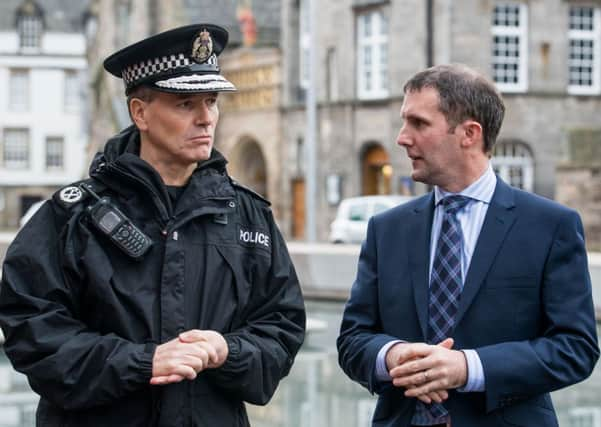Scotland’s murder rate down to record low


Figures from the chief statistician show there were 61 homicide victims in 2013-14, a drop on the previous year and the lowest number since current records began in 1976.
The figures include murders and culpable homicides, but not deaths caused by dangerous or careless driving.
Advertisement
Hide AdAdvertisement
Hide AdGlasgow continues to account for the biggest proportion of the deaths (30 per cent) – more than three times higher than its share of the population.
But the city has seen a 54 per cent fall since 2004-05, with the overall number of homicide cases in the city decreasing to 18 from 39 a decade ago. The fall in the number of Glasgow’s homicide cases accounts for 28 per cent of the decrease across Scotland as a whole in that period.
The overall downward trend was welcomed yesterday by newly appointed justice secretary Michael Matheson, but critics said the exclusion of motoring deaths helped present a “selective analysis”. Mr Matheson said: “Homicide is a devastating crime for the families of victims and while I am encouraged that last year we had the lowest levels on records, we cannot be complacent and must never forget the grieving families left behind.”
Despite the declining number of cases nationally, the figures once again highlight Scotland’s destructive relationship with alcohol, with more than 60 per cent of those accused of homicide under the influence.
CONNECT WITH THE SCOTSMAN
• Subscribe to our daily newsletter (requires registration) and get the latest news, sport and business headlines delivered to your inbox every morning
Where the main motive for a homicide was “rage” or a fight, 79 per cent of the main accused were under the influence of alcohol and or drugs.
“Sharp instruments”, predominantly knives, were used in around a third of all killings.
Mr Matheson said: “It is concerning that alcohol and drugs continue to be factors in over half of homicides and is another stark reminder of the devastating social harm these substances can cause.
Advertisement
Hide AdAdvertisement
Hide Ad“This is one reason why we are continuing in our efforts to encourage people to drink less alcohol, maintaining our commitment to introduce minimum pricing, and to tackle the scourge of cheap, strong alcohol. Our national drugs strategy is also having an effect and problem drug use is also falling, particularly amongst young people.”
He said the government was also looking at further ways to reduce knife crime by continuing the successful No Knives,
Better Lives initiative and increasing the maximum sentence for carrying a blade from four to five years.
The figures, which were released in the report Homicide in Scotland 2013-14, show that as of yesterday, police had recorded 60 cases of homicide in 2013-14, three fewer than the previous year. One case involved two victims, taking the total number of victims to 61 – two fewer than 2012-13. Police have identified accused for all of the 60 cases.
Nearly three-quarters of cases occurred within the home, while 22 per cent took place in outdoor public places and 5 per cent in indoor public places.
Three-quarters of victims (46 people) were male, as were the overwhelming majority (84 per cent) of those accused of the crimes.
Whereas female victims were more likely to be killed by a partner or ex-partner, male victims were more likely to be killed by a social acquaintance.The most common reasons recorded for committing homicide during the past decade were “fight or quarrel” and “rage or fury”, with just under half (47 per cent) of all victims killed in such circumstances.
Deputy Chief Constable Iain Livingstone said: “Policing in Scotland has a strong record of homicide detection and we continue to work every day to reduce not only homicides but all forms of crime, especially violent crimes.
Advertisement
Hide AdAdvertisement
Hide Ad“Recent cases such as the convictions of Angus Sinclair for the World’s End Murders and John Docherty for the historic murder of Elaine Doyle should give the public confidence that regardless of how long it takes we will continue to work with partners to bring to justice those who take the life of another. The recent reform of policing in Scotland and the creation of a single force has brought many benefits, including ensuring that every community across Scotland has equal access to specialist officers like the Major Investigation Teams who specialise in homicide investigations.”
Glasgow remains Scotland’s murder capital, with 18 of the 60 homicide cases, while Edinburgh recorded nine, up from two the previous year but in line with previous years.
Both Fife and South Lanarkshire saw four homicide cases, while there were three in Midlothian. Despite their size relative to other council areas, Aberdeen City and Highland recorded just one homicide each.
There was criticism of the Scottish Government earlier this month when it emerged that official statistics showing recorded crime is at a 40-year low had not included around 500,000 offences such as stalking and assault.
Tory justice spokeswoman Margaret Mitchell questioned why statistics showing 17 deaths from dangerous driving and 20 from careless driving had not been included in yesterday’s homicide figures.
She said: “It is good news the number of homicides appear to have gone down, but on closer inspection of the statistics this is only if dangerous and careless driving cases are excluded.
“The lingering suspicion is the Scottish Government is not presenting a complete picture and their selective analysis is being trumpeted as a huge success.”
She added: “Whilst the Scottish Government is hailing today’s figures as the best for a number of years, Scotland still has a higher homicide rate than England and Wales.”
SCOTSMAN TABLET AND IPHONE APPS